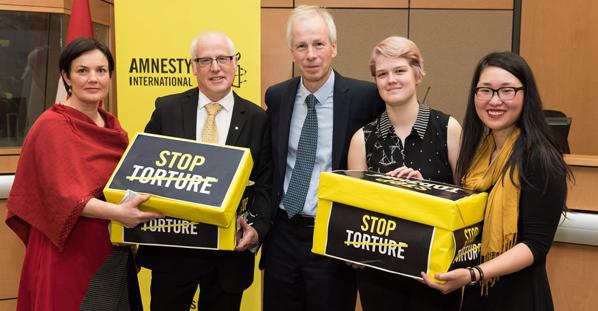Human rights defenders, torture survivors, parliamentarians and youth activists celebrated a significant milestone following the announcement that Canada has committed to joining an important UN torture prevention treaty. Foreign Affairs Minister Stephane Dion made the announcement in Ottawa as he accepted more than 50,000 Amnesty International petition signatures calling on Canada to help end torture around the world.
“The news that Canada is readying to join the Optional Protocol to the Convention against Torture is a tremendous step forward. It is long overdue and will position Canada strongly in the global fight to prevent torture. This has been 13 years in the waiting. Now it is time to make it happen.”
– Alex Neve, Secretary-General of Amnesty International Canada
Torture remains a pervasive problem despite having been unconditionally prohibited in international treaties and national constitutions, with 159 countries party to the United Nations Convention against Torture. Over the past five years Amnesty has reported torture or other ill-treatment in 141 or 79 percent of the world’s countries. Banning torture clearly is not enough. Measures are needed to prevent torture from happening at all.
An important prevention mechanism is increased scrutiny and oversight of prisons where torture takes place. This is the focus of the so-called Optional Protocol to the Convention against Torture, adopted by the United Nations in 2002. It aims to prevent torture from happening by putting in place regular national and international inspections of detention centres to ensure they are safe and meet international standards.
Ten years ago, Canada promised the UN to consider signing on to the Optional Protocol to the Convention against Torture. That promise was repeated in 2009. But in 2013 the former government told the UN that Canada had no intention to join at this time. Yesterday, Minister Dion announced at a private event co-hosted by Amnesty International and a cross-party group of MPs and Senators, that the Optional Protocol “would not be optional” any more for Canada. Amnesty welcomes this announcement and looks forward to further details about the next steps Canada will take to formally join the Optional Protocol.
“We now look to the provinces and territories to work closely with the federal government to make sure that Canada joins the Optional Protocol in short order,” says Béatrice Vaugrante, Directrice générale, Amnistie internationale Canada francophone. “Consultations are needed but must not be protracted. There must be a clear plan and expedited timeline. Until Canada formally signs on, Canadian diplomats will continue to lack leverage to put pressure on nations where torture is rife.”
To date, Canada’s failure to join other allies who support the process of international inspection centres has left Canadians detained abroad more vulnerable to torture and ill-treatment because the government cannot demand the openness to detention centre inspections demanded by the Optional Protocol. “We cannot demand of others what we do not accept for ourselves,” adds Ms Vaugrante.
Signing on will also enhance prison oversight at home. Deaths and other abuses in immigration detention in Canada and the abuse of solitary confinement – both of which are of growing concern across the country – will be subject to greater scrutiny if Canada is party to the Optional Protocol.
Over 50,000 Canadians have signed petitions urging Canada to join the Optional Protocol as part of Amnesty International’s global campaign to Stop Torture.
“Torture is wrong anywhere, against anyone, for any reason”, says Alex Neve. “Torture thrives when no one is watching and no one is calling out the officials who order it or carry it out. By joining the Optional Protocol, Canada will show the rest of the world we truly mean it; that Canada is committed to ending torture.”






















